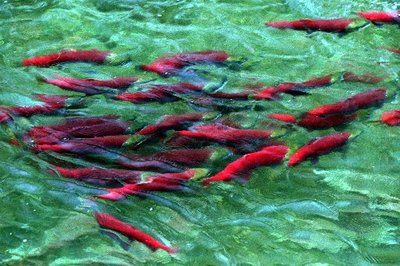forum
library
tutorial
contact

Ruling an Opportunity for Stakeholders
to Write Salmon Recovery Plan
by Riley Starks
Bellingham Herald, August 14, 2011
|
the film forum library tutorial contact |

|
Ruling an Opportunity for Stakeholders
by Riley Starks
|
 Earlier this month, I joined more than 350 other Washington state business owners, and more than 1,000 nationwide, in a letter to President Obama. We asked him to take a new direction in the long wrangle over restoring the wild salmon and steelhead of our state's Columbia and Snake rivers.
Earlier this month, I joined more than 350 other Washington state business owners, and more than 1,000 nationwide, in a letter to President Obama. We asked him to take a new direction in the long wrangle over restoring the wild salmon and steelhead of our state's Columbia and Snake rivers.
The opportunity for a new and smarter path has opened because a federal judge in Portland just ruled that the government's current approach to restore our region's iconic fish is illegal. This is the third Columbia/Snake salmon plan, each issued under a different president, to come up short in the courtroom.
In my business, I try to use mistakes as a spur to change. That's how I hope the Obama administration and Washington's members of Congress use the court's action - as a catalyst for a different path forward.
I fish commercially for salmon and own a fine-dining restaurant and inn on Lummi Island. Our attractions are amazing location, amazing atmosphere and amazing food. We grow and catch as much of the food we serve as possible. For most of us across Washington state who signed the letter to the president, our businesses and communities, our families and foods are all knit together in ways of life and livelihood that depend on healthy and productive lands and waters.
I've followed the Columbia Basin salmon crisis for years. It's in my interest as a businessman, citizen and father that the greatest salmon watershed god ever made is restored to again produce abundant, fishable populations of salmon. It seems to me that all these illegal plans have shared a common goal: Protect federal dam operations at all costs while doing the minimum necessary to keep salmon from going extinct. But this hasn't worked - for the court or the economy. An effective strategy that swiftly restores salmon to productivity will better serve the needs and interests of our businesses and communities on both sides of the state.
But this strategy won't come from dam agencies - after three strikes they should be out. It can, however, come from people. Our letter asks President Obama to establish a stakeholder process where fishermen, farmers and energy users work directly together to craft a lawful, science-based plan that produces value for all. It won't be easy, but it's unlikely to take 20 years, cost $8 billion, and be ruled illegal three times.
President Obama is in charge of federal salmon policy, so we directed our letter to him. For me, however, it is also to Sens. Patty Murray and Maria Cantwell. They will have great influence on whether the administration changes course or sticks with failure. And if the court's verdict is attacked in Congress - a distinct possibility - they also have the power to stop it.
Since an attack on the verdict is an attack on hundreds of Washington businesses and thousands of people we employ, I fervently hope they will stop it. Overturning the court decision will produce no solutions for businesses, east or west, in our state. It will divide the state when we should be coming together. I hope instead that the senators work to establish stakeholder talks with the goal of lawful solutions that can benefit all.
learn more on topics covered in the film
see the video
read the script
learn the songs
discussion forum
